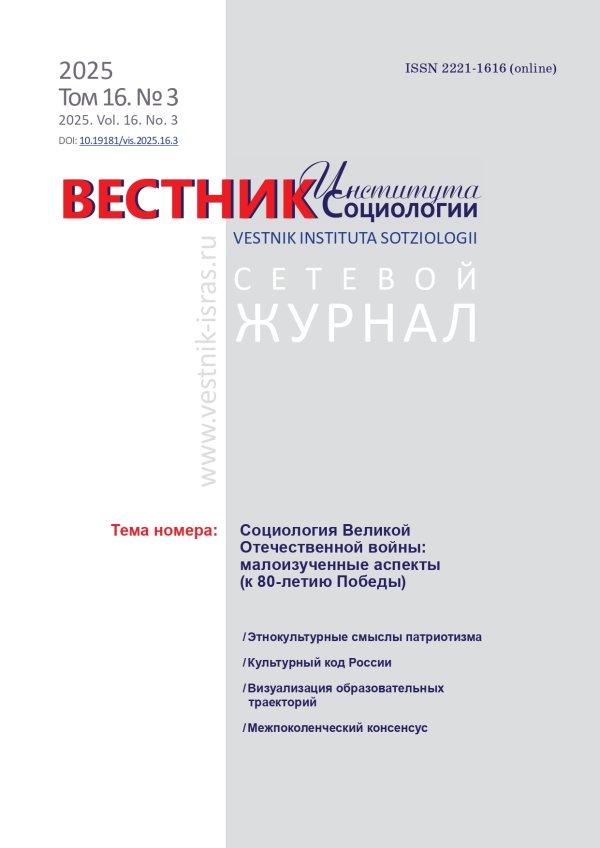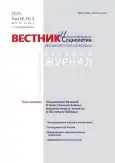Bulletin of the Institute of Sociology
ISSN: 2221-1616
Publication frequency: quarterly. Founded in 2010
Editor-in-Chief: Mikhail K. Gorshkov, Academician RAS
Included in: White list (2nd level)
Indexation: WoS RSCI, РИНЦ
Double blind peer review
Open Access
The mission of the online peer-reviewed journal Vestnik Instituta sociologii (Bulletin of the Institute of Sociology) is to distribute the most relevant sociological and political studies provided by Russian scholars, especially in Russian regions. No less important for the journal is publishing the articles of foreign scholars to inform Russian researchers about current scientific directions of theoretical and methodological investigations of West and East researchers.
The priority is accorded to materials based on current research results reflecting social and political aspects of Russian daily life, and socio-political processes of Russia and other countries.
Main journals’ aims
to support the further development of Russian sociology and political science,
to respond the informational needs of specialists and professionals, government officials, representatives of public associations, and other citizens, and organizations,
to promote the integration of professional community of sociologists and political scientists in Russian Federation,
to distribute the achievements of Russian sociology and political science in the informational space of the post-Soviet states,
to develop the informational exchange between Russian scholars and their colleagues from other countries.
The journal was funded by the Institute of Sociology RAS since 2010.
The Bulletin of the Institute of Sociology is published quarterly online. The journal provides permanent free access to all issues in PDF.
There are no fees taken from the authors and no honorariums given for the papers.
The journal has ISSN 2221-1616 (online) and is officially registered in the Federal Service for Supervision in the Area of Telecom, Information Technologies and Mass Communications (Electronic No. 77 - 73108).
The journal is indexed by the Web of Science Russian Science Citation Index
Editor-in-Chief
M.K. Gorshkov, Academician, Director of the Federal Center of Theoretical and Applied Sociology of the Russian Academy of Sciences
Publisher
Federal Center of Theoretical and Applied Sociology of the Russian Academy of Sciences.
Current Issue
Vol 16, No 3 (2025)
About the Issue
The Great Patriotic War and the Development of Russian Civilization
 10-14
10-14


Sociology of the Great Patriotic War: Little-Studied Aspects (on the 80th Anniversary of Victory)
Ethnocultural Meanings of Patriotism and Historical Memory among the Peoples of Chukotka
Abstract
 15-36
15-36


Creative Labour as a Victory Factor: Theatre and Other Arts in the Wartime USSR
Abstract
 37-51
37-51


Memory of the Great Patriotic War in the Far East regions: Commemorative Practices of Student Youth
Abstract
 52-68
52-68


The Space of School Events in Nizhny Novgorod Dedicated to the 80th Anniversary of Victory in the Great Patriotic War
Abstract
 69-86
69-86


Characteristics of Russia Civilizational Development
National Cultural Сode: Moral and Ethical Aspects
Abstract
 87-119
87-119


On the Specifics of Don Cossack Monasteries (Gender Aspects)
Abstract
 120-141
120-141


A Social Constructivist Approach to the Analysis of the Institutional Order of Modern Cossacks
Abstract
 142-161
142-161


Problems of Russian Education
Generational Relationships in the Academic and Teaching Community: A Problem Statement
Abstract
 162-186
162-186


Variability of Educational Trajectories in an Intergenerational Context: From Simple to Complex Strategies
Abstract
 187-202
187-202


On the Social Effects of the Managerial Approach and Per-Capita Normative Financing of Higher Education
Abstract
 203-228
203-228


Tribune of a young scientist
Perceptions of the Rich-Poor Contradiction by the Russian Population: Dynamics and Factors
Abstract
 229-252
229-252


Scientific Forums
Social and Managerial Aspects of Artificial Intelligence (AI) Development: Results of the Methodological Seminar of FCTAS RAS
Abstract
 253-263
253-263


Anniversaries
 264-265
264-265


 266-267
266-267


 268-269
268-269












